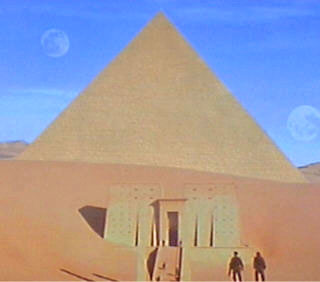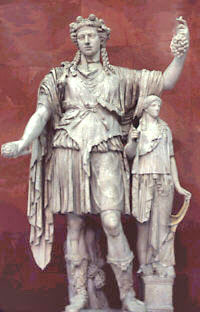
Part 5
In the last two entries we
spoke of Dionysus and Demeterís mystery religion and the association
with ceremony and ritual involving imitative magic based on universal
beliefs about spirit-containers, orcas, pits, and the larger issue of
"as on earth, so in heaven".
While much is still unknown about the
mysteries of these deities, the basis of Demeterís popularity was
almost certainly rooted in her divinity as a mother-earth goddess.
Demeter (De or Da "earth", and meter "mother") actually
means "earth mother." As mother earth, Demeter was the giver of
generosity and grace and the controller of the awesome forces of
nature. She was loved as the giver of food and fertility and feared as
the taker of life. She could open her womb with blessings and
abundance or enclose the dead in her soil.
 Without
a doubt, the worship of the earthís "spirit" as a mother, and the
incarnation of the earthís fertility forces within specific goddesses,
was one of the oldest and most widely held religious ideas in
antiquity. Whether it was Inanna of the Sumerians, Ishtar of the
Babylonians, or Fortuna of the Romans, every civilization had a sect
based on the embodiment of the earthís spirit as a mother-goddess. The
Egyptians worshipped Hathor in this way, as did the Chinese, Shingmoo.
The Germans worshipped Hertha as the great Mother Earth, and even some
Hebrews idolized "the queen of heaven". In Greece, the queen of the
Olympian goddesses and wife of Zeus was Hera; the benevolent earth
mother. Before her was Gaia (Gaea, the Greek creator-mother
earth) and beneath her many others including Artemis, Aphrodite and
Hecate.
Without
a doubt, the worship of the earthís "spirit" as a mother, and the
incarnation of the earthís fertility forces within specific goddesses,
was one of the oldest and most widely held religious ideas in
antiquity. Whether it was Inanna of the Sumerians, Ishtar of the
Babylonians, or Fortuna of the Romans, every civilization had a sect
based on the embodiment of the earthís spirit as a mother-goddess. The
Egyptians worshipped Hathor in this way, as did the Chinese, Shingmoo.
The Germans worshipped Hertha as the great Mother Earth, and even some
Hebrews idolized "the queen of heaven". In Greece, the queen of the
Olympian goddesses and wife of Zeus was Hera; the benevolent earth
mother. Before her was Gaia (Gaea, the Greek creator-mother
earth) and beneath her many others including Artemis, Aphrodite and
Hecate.
The principle idea was that
the earth
is a living entity. The ancient and universally accepted notion that
the "living earth" was also a fertile mother was conceptualized in
different ways and in various goddess myths and images throughout the
ancient world. In The Golden Asse, by second century Roman
philosopher Lucius Apuleius, the earth was perceived as a feminine
force, which incarnated itself at various times and to different
people within the goddess mothers. Note how Lucius prays to the earth
spirit:
"O blessed Queene of
Heaven, whether thou be the Dame Ceres [Demeter] which art the
original and motherly source of all fruitful things in earth, who
after the finding of thy daughter Proserpina [Persephone], through
thy great joy which thou diddest presently conceive, madest barraine
and unfruitful ground to be plowed and sowne, and now thou
inhabitest in the land of Eleusie [Eleusis]; or whether thou be the
celestiall Venus....[or] horrible Proserpina...thou hast the power
to stoppe and put away the invasion of the hags and ghoasts which
appeare unto men, and to keep them downe in the closures [womb] of
the earth; thou which nourishest all the fruits of the world by thy
vigor and force; with whatsoever name is or fashion it is lawful to
call upon thee, I pray thee, to end my great travaile..."
The earth spirit responds to Lucius:
"Behold Lucius I am come, thy weeping
and prayers hath mooved me to succour thee. I am she that is the
natural mother of all things, mistresse and governesse of all the
elements, the initial progeny of worlds, chiefe of powers divine,
Queene of heaven, the principall of the Gods celestiall, the light
of the goddesses: at my will the planets of the ayre [air], the
wholesome winds of the Seas, and the silence of hell be disposed; my
name, my divinity is adored throughout all the world in divers
manners, in variable customes and in many names, for the Phrygians
call me the mother of the Gods: the Athenians, Minerva: the
Cyprians, Venus: the Candians, Diana: the Sicilians, Proserpina: the
Eleusians, Ceres: some Juno, other Bellona, other Hecate: and
principally the aethiopians...Queene Isis."
Some assume,
based on such texts, that a single spiritual source or realm energized
the many goddess myths. In the ancient Hymn, To Earth The Mother Of
All, Homer illustrates how the earth-spirit was universally
involved in the affairs and lives of nations. Through Homerís
dedication to the earth, we discover how far-reaching and omnipresent
the mother-earth spirit was thought to be:
"I will sing of well founded Earth,
mother of all, eldest of all beings. She feeds all creatures that
are in the world, all that go upon the goodly land, and all that are
in the paths of the seas, and all that fly: all these are fed by her
store. Through you, O queen, men are blessed in their children and
blessed in their harvests, and to you it belongs to give means of
life to mortal men and to take it away. Happy is the man whom you
delight to honour! He hath all things abundantly: his fruitful land
is laden with corn, his pastures are covered with cattle, and his
house is filled with good things. Such men rule orderly in their
cities of fair women: great riches and wealth follow them: their
sons exult with ever-fresh delight, and their daughters in
flower-laden bands play and skip merrily over the soft flowers of
the field. Thus it is with those whom you honour O holy goddess,
bountiful spirit. Hail, mother of the gods, wife of starry Heaven;
freely bestow upon me for this my song substance that cheers the
heart! And now I will remember you and another song also."
From these and other ancient records it
is obvious that the earth spirit was more than an agricultural or
herbaceous facility, she was the personable and "eldest of all
beings," the "holy goddess," the "bountiful spirit," the all
nourishing mother of men who manifested herself within the popular
idols of the many goddess myths.
Christian theologians agree that the
physical earth contains living, spiritual forces. In the Book of
Revelation, chapter nine and verse fourteen, we read of "the four
angels which are bound in the great river Euphrates." Likewise, in Job
26:5, we find "Dead things are formed from under the waters." The
literal Hebrew translation is, "The Rafa (fallen angels) are made to
writhe from beneath the waters."
Additional biblical references typify
the earth as a kind of holding tank, or prison, where
God has bound
certain fallen entities. (2 Pet. 2:4; Jude 6) That such fallen spirits
seek to communicate with, or participate in, the affairs of humanity,
is defined in Scripture. As previously noted, the Hebrews were warned
of spirits that might seek regular communion with men ( Deut. 18:11),
and, when the witch of Endor communicated with the same, they ascended
up from "out of the earth" (1 Sam. 28:13) as "gods".
Back to
Contents
Next - Part Six